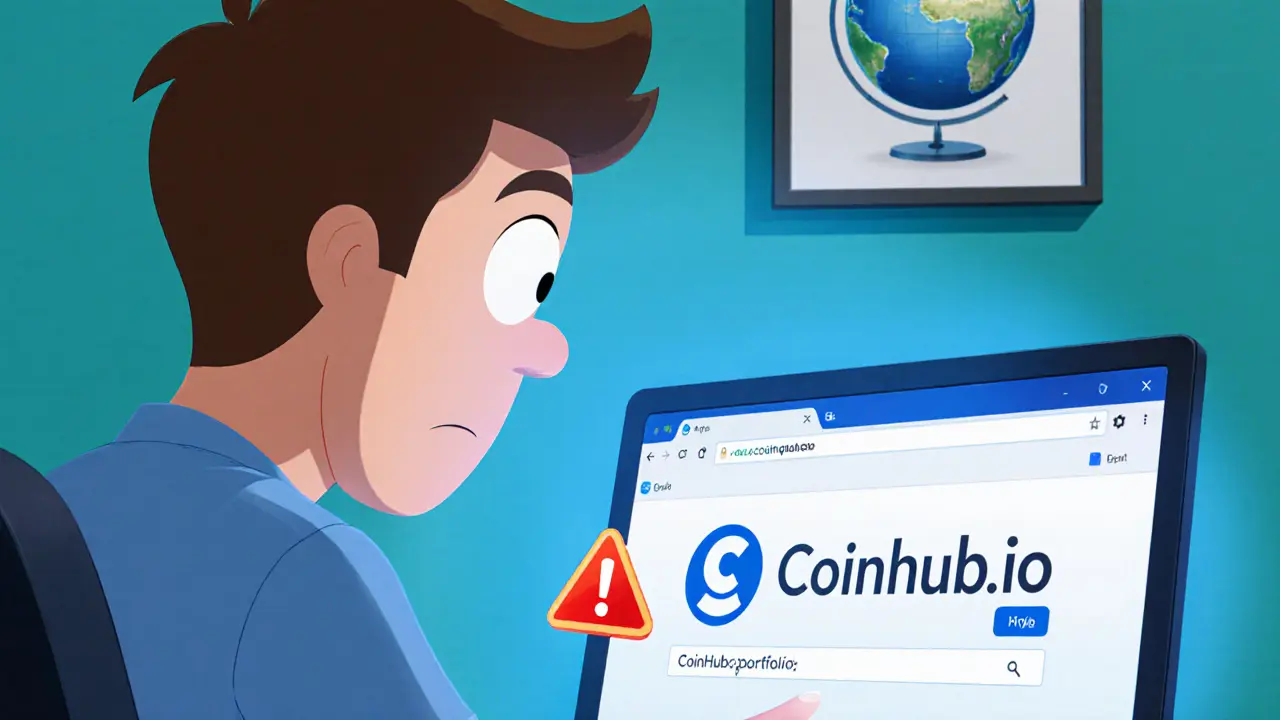Crypto Exchange Safety Checker
Check Your Exchange's Safety
Enter the name of a cryptocurrency exchange and assess its safety based on critical factors like regulatory compliance, security audits, and user feedback.
Safety Criteria
Check which criteria apply to the exchange you're evaluating
Results
How to Use This Tool
This tool assesses exchanges based on key safety criteria. Check the criteria that apply to the exchange you're evaluating, and our system will calculate a risk score based on the missing elements.
Low risk score (5-6 points): This exchange meets most safety standards and is likely legitimate.
Medium risk score (3-4 points): This exchange shows some red flags but may still be usable with caution.
High risk score (0-2 points): This exchange lacks critical safety features and should be avoided.
When you see a new name pop up in the crypto world, the first question is always the same: Coinhub.io review - is it safe, cheap, and actually works? Below we break down everything you need to know before you click ‘sign‑up’. We’ll look at what Coinhub.io claims to offer, compare it with the legitimate CoinHub portfolio app, and see how it stacks up against a big‑player exchange.
What is Coinhub.io?
Coinhub.io is presented as an online cryptocurrency exchange that promises low fees, a wide range of assets, and simple fiat on‑ramps. The site’s branding is very similar to another product called CoinHub, but that one (found at coinhub.org) is a completely offline portfolio tracker, not a trading platform.
The confusion starts with the domain. All reputable sources point to coinhub.org for the portfolio app, while coinhub.io has no verifiable corporate filings, license disclosures, or third‑party security audits. That alone is a red flag worth noting early in any review.
Core Features Claimed by Coinhub.io
- Over 100 crypto assets listed for trading.
- Maker fee of 0.20% and taker fee of 0.25% (according to a 2025 Cryptowisser snapshot).
- Fiat deposits via wire transfer and credit cards.
- Margin and futures trading options (mentioned on WikiBit).
- 24/7 live chat support.
Notice how many of these claims come from sources that never directly examined the platform. There are no publicly shared order‑book depth charts, no verified trading volume numbers, and no audit reports from firms like CertiK or OpenZeppelin.
Security Model - What We Actually Know
Security audit is a systematic review of a platform’s code and infrastructure by an independent security firm is a standard expectation for any exchange handling user funds. For Coinhub.io, there is zero evidence of such an audit. The only security mention comes from the portfolio‑tracker version (CoinHub), which stores data locally on the user’s device-great for privacy, but irrelevant for an online exchange that must move funds on‑chain.
Without a documented audit, users cannot verify if the platform is protected against common attacks like withdrawal exploits or API manipulation. In addition, the site does not list a clear KYC (Know‑Your‑Customer) process, another compliance cornerstone.
KYC & AML Compliance
KYC requires users to submit identity documents before they can trade or withdraw is mandatory in most regulated jurisdictions. Coinhub.io’s public pages merely say “verification may be required for large withdrawals” and provide no details about the documents needed, how data is stored, or whether the process is handled by a reputable third‑party provider.
Regulatory licenses are also missing. Exchanges operating in the US, EU, or UK typically display their registration numbers (e.g., NYDFS BitLicense, FCA registration). Coinhub.io does not disclose any such license, making it impossible to confirm if it meets local AML (Anti‑Money‑Laundering) standards.
Fee Structure - How Does It Compare?
Below is a quick side‑by‑side comparison of the most frequently quoted fees for Coinhub.io, the legitimate portfolio app (CoinHub), and a market‑leader exchange.
| Feature | Coinhub.io | CoinHub (portfolio app) | Binance (established exchange) |
|---|---|---|---|
| Maker fee | 0.20% | N/A (no trading) | 0.02%‑0.10% |
| Taker fee | 0.25% | N/A | 0.04%‑0.12% |
| BTC withdrawal fee | 0.0007 BTC | N/A | 0.0005 BTC |
| Supported assets | ~100 (claimed) | All coins you track locally | >500 |
| KYC required? | Unclear | None (offline tool) | Yes, tiered |
| Security audit published | None found | None (offline) | CertiK, PeckShield, etc. |
| Regulatory license | Not disclosed | Not applicable | Multiple global licenses |
The table shows that, even if the fee numbers are accurate, Coinhub.io still lags behind top exchanges on liquidity, asset coverage, and compliance.
Liquidity & Trading Volume
Liquidity is the ability to buy or sell without moving the market. Established exchanges publish 24‑hour volume figures (e.g., Binance reports $30B daily). Coinhub.io offers no public volume data, nor does it list any market‑making partners. Without that information, traders can’t gauge slippage risk or order‑book depth.
User Experience - What Do Real Users Say?
Searching for authentic user reviews turns up almost nothing. Cryptogeek recorded a single 3/5 rating from one reviewer, which suggests either very low adoption or a lack of genuine feedback channels. No mentions on Reddit, Trustpilot, or mainstream forums have surfaced. This scarcity makes it hard to assess the platform’s reliability.
Red Flags Summary
- Domain mismatch - legitimate CoinHub lives at coinhub.org, not coinhub.io.
- No visible regulatory license or compliance statements.
- Lack of third‑party security audit reports.
- Very limited independent user feedback.
- No disclosed liquidity sources or trading‑volume metrics.
If a platform can’t answer any of these points, it’s wise to treat it with caution.

How to Safely Test a New Exchange (If You Still Want to Try)
- Start with a small deposit (e.g., $10‑$20) and monitor withdrawal speed.
- Enable two‑factor authentication (2FA) as soon as you create the account.
- Confirm the exact wallet address you receive before sending any crypto; copy‑paste errors are a common scam vector.
- Check the SSL certificate - the URL should begin with
https://and show a valid lock icon. - Keep records of every transaction (screenshots, email confirmations) in case you need to dispute a loss.
Even with these safeguards, the safest route is to stick with exchanges that are transparent about licensing, audits, and user volume.
Alternatives Worth Considering
If you’re looking for a low‑fee, beginner‑friendly platform, here are three options that meet most compliance standards:
- Coinbase - strong regulatory licensing, clear fee schedule, solid security audits.
- Kraken - low taker fees (as low as 0.16%), robust KYC, and a reputation for security.
- Binance - massive liquidity, over 500 assets, and a transparent audit history.
All three provide detailed help centers, verified audit reports, and community forums where you can read real user experiences.
Next Steps & Troubleshooting
If you’ve already signed up on Coinhub.io and are facing issues, try these quick fixes:
- Login problems: Clear browser cache, ensure you’re using the latest version of Chrome or Firefox, and verify the URL is exactly
https://coinhub.io. - Deposit not reflected: Double‑check the transaction hash on the corresponding blockchain explorer (e.g., Bitcoin for BTC deposits). If the hash shows “confirmed” but the balance is unchanged, reach out to support with the hash ID.
- Withdrawal delays: Confirm that you’ve completed any pending KYC steps. Some platforms hold funds until verification is finished.
- No response from support: Look for an official email address ending in @coinhub.io. If replies are missing after 48hours, consider escalating via social media or filing a complaint with your local consumer protection agency.
Remember, if the platform cannot provide clear answers, it’s a strong indicator that you should move your funds elsewhere.
Frequently Asked Questions
Is Coinhub.io a legitimate crypto exchange?
Based on public records, Coinhub.io lacks a regulatory license, security audit, and verifiable corporate information. Those missing pieces make it hard to deem the platform legitimate.
What are the trading fees on Coinhub.io?
The site advertises a taker fee of 0.25% and a maker fee of 0.20%, but there’s no independent source confirming those numbers.
Does Coinhub.io require KYC?
The platform mentions verification for large withdrawals, but it does not publish a detailed KYC policy or required documents.
How can I withdraw Bitcoin from Coinhub.io?
Enter the withdrawal amount, provide a destination BTC address, and confirm the transaction. The site charges 0.0007BTC per withdrawal, but users have reported occasional delays without official explanations.
Are there safer alternatives for beginners?
Yes. Exchanges like Coinbase, Kraken, and Binance provide clear licensing, audited security, and extensive community support, making them better choices for new traders.




15 Comments
Steve Cabe
Coinhub.io presents itself as a regulated exchange, yet there is no evidence of any licensing authority oversight. The website fails to publish any third‑party security audit, which is a baseline requirement for custodial platforms. Moreover, the claimed trading volume is nowhere to be found on reputable data aggregators, suggesting that liquidity is either negligible or fabricated. Without transparent KYC procedures, users cannot be sure their identities are protected or that the platform complies with AML laws. In short, the red flags outweigh any superficial fee advantages.
shirley morales
The entire premise is a disservice to informed investors.
Mandy Hawks
When one examines the foundations of trust, the absence of verifiable audits becomes a philosophical void. It is not merely a technical omission but a breach of the social contract between platform and participant. Users, in essence, are asked to believe without evidence, a stance that many thinkers would deem untenable. Consequently, prudence suggests seeking exchanges where transparency is an explicit value.
Millsaps Crista
Look, I get the lure of low‑fee promises, but you don’t want to gamble your hard‑earned crypto on a mystery shop. Start with a tiny deposit, test the withdrawal, and keep your 2FA on at all times. If you notice any weird lag or vague support replies, pull the plug and move to a proven exchange. Better safe than sorry, especially when the platform’s background is so murky.
Wayne Sternberger
Dear fellow investors, it is with great concern that I address the matter of Coinhub.io. The platform’s documentation appears to be lacking, and there are numerous misspells in the legal sections, such as "thier" and "definately". Such oversights raise questions about the rigour of their compliance practises. I would strongly advise performing thorough due dilligence before committing any assets.
John Beaver
From a technical standpoint, the absence of a published API specification is troubling. Without clear endpoint docs, developers cannot safely integrate or audit transaction flows. Additionally, the withdrawal fee of 0.0007 BTC is higher than most Tier‑1 exchanges, yet no justification is provided. These factors collectively suggest a platform still in its infancy or operating without proper oversight.
EDMOND FAILL
Just scrolling through the site, it feels like a placeholder rather than a full‑blown exchange. Nothing on volume charts, nothing on order‑book depth – just a glossy UI. If you’re curious, try a micro‑deposit first and see how fast (or if) they actually send it back.
Maria Rita
Hey there, I know how scary new platforms can seem. Remember, the safest path is always the one with clear rules and real user stories. If you feel any doubt, pause and check a bigger exchange first. Your peace of mind is worth more than a few dollars saved on fees.
Jordann Vierii
From a cultural perspective, the crypto space thrives on openness and community verification. When a service hides its licensing and audit info, it breaks that culture of shared trust. It’s akin to a restaurant that never shows its health inspection scores. Users worldwide rely on those signals to decide where to place their money.
Hari Chamlagai
Let us be absolutely clear: a platform that cannot produce a single audited report is operating on speculation, not on substance. The lack of regulatory disclosure is not a minor oversight; it is a fundamental breach of fiduciary duty. Users must demand transparency, otherwise they become unwitting participants in potential fraud. The silence surrounding liquidity sources further compounds the risk. In the crypto realm, opacity is a red flag that should never be ignored. Proceed only if you are prepared to accept total loss.
Jason Clark
Oh, the joy of another “low‑fee” exchange that forgets to mention where the fees actually go. It’s almost charming how they claim 0.20% maker fees without any proof of market depth. One might suspect they’re simply passing the cost onto unsuspecting users via hidden spreads. The irony is palpable, given the touted “transparent” fee structure.
Jim Greene
Stay hopeful, folks! Even if Coinhub.io looks shaky now, the market always evolves 🌱. Keep your security tight and your research thorough, and you’ll navigate any rough waters 😎.
Teagan Beck
I appreciate the thorough breakdown; it helps a lot.
Kim Evans
Quick tip: always screenshot the deposit address and transaction hash before confirming. It saves headaches later 😊.
Russel Sayson
When evaluating any crypto exchange, one must first consider the epistemological foundation upon which its legitimacy rests. In the case of Coinhub.io, the conspicuous absence of publicly verifiable licensing operates as an ontological void, eroding any claim to regulatory compliance. Moreover, the platform's failure to disclose third‑party security audits undermines the necessary trust calculus that users perform intuitively. This omission is not merely a procedural lapse; it signals a deeper structural deficiency in risk management practices. The lack of transparent KYC processes further compounds the issue, as identity verification forms a cornerstone of anti‑money‑laundering frameworks mandated by most jurisdictions. Without documented KYC policies, users are left in a precarious position where their personal data may be mishandled or inadequately protected. Additionally, the silence regarding liquidity sources invites speculation about order‑book depth and potential price manipulation. A robust exchange typically publishes its 24‑hour trading volume, yet Coinhub.io offers no such data, leaving traders unable to gauge slippage risk. The fee structure, while ostensibly competitive, lacks independent verification, raising the possibility of hidden spreads or dynamic pricing models that could disadvantage users. From a security perspective, the non‑existence of audit reports eliminates a critical external validation of code integrity, making the platform vulnerable to exploits that are common in under‑audited systems. The aggregate of these deficiencies constructs a narrative that is more cautionary than promotional. Practically speaking, any rational investor should allocate only a nominal amount for testing purposes, if at all, and maintain rigorous two‑factor authentication throughout. Documenting each transaction meticulously, including screenshots of blockchain confirmations, is advisable for potential dispute resolution. Ultimately, the prudent path lies with exchanges that voluntarily disclose licensing, audit reports, and transparent liquidity metrics, thereby aligning with industry best practices and safeguarding user assets.